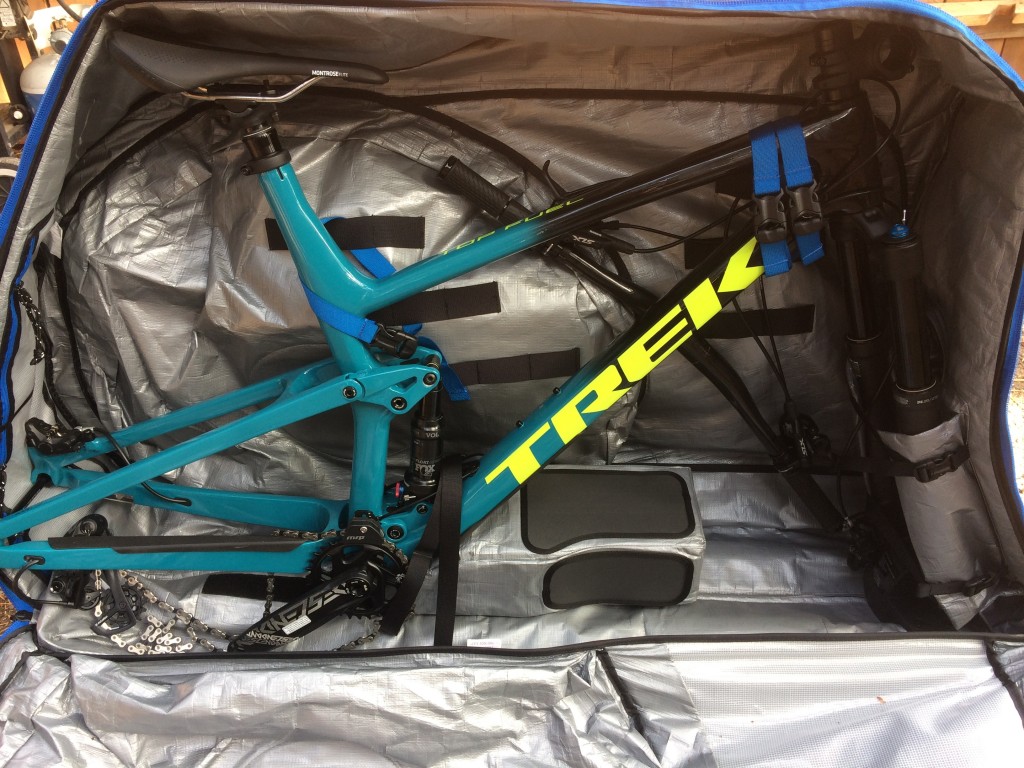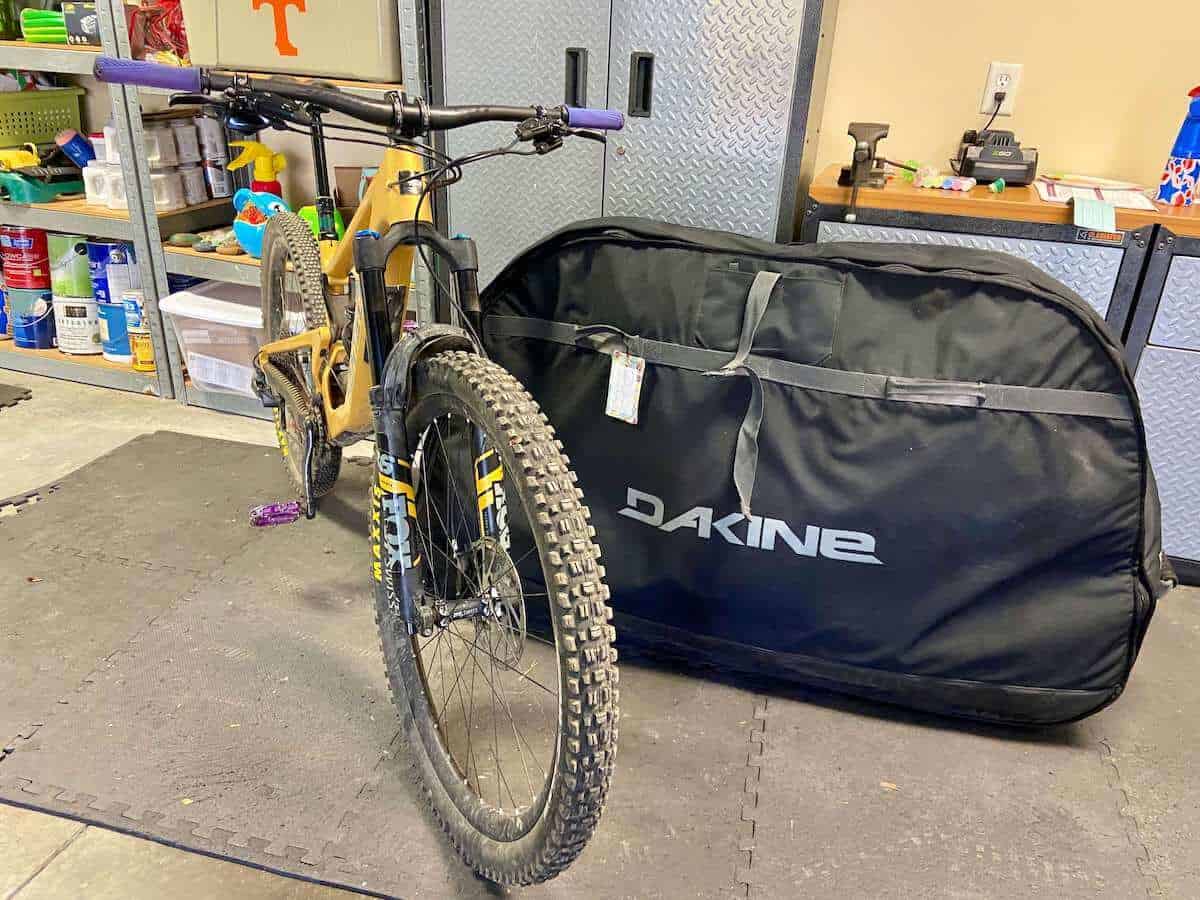Mountain bike travel cases protect your bike during transport and simplify check-ins. These cases come in hardshell and softshell varieties for different levels of protection.
Traveling with your mountain bike opens a world of adventure, allowing you to tackle trails far from home. Yet, the journey to get there can be tough on your gear.
A robust mountain bike travel case is an essential investment for cyclists aiming to keep their prized possession safe in transit.
Whether you’re flying to a race or driving to a distant trailhead, the right case shields your bike from the knocks and bumps of travel.
Designed to fit various bike sizes and styles, these cases balance durability with ease of handling, often featuring wheels and handles for improved mobility. Selecting the proper case ensures peace of mind, letting you focus on the ride ahead.

Credit: www.outdoorgearlab.com
Choosing The Right Mountain Bike Travel Case
Traveling with your mountain bike opens doors to adventure. But, it’s crucial to protect your bike on its journey. The right mountain bike travel case is key. Let’s dive into how to choose one.
Size And Compatibility
Not all bikes fit in all cases. Measure your bike first. Consider the length, height, and width. Check these against the case’s dimensions. Remember the wheels and handlebars. Some cases fit these without removal.
- Measure bike dimensions
- Compare with case sizes
- Check wheel and handlebar compatibility
Hardshell Vs. Softshell Cases
Choosing between hardshell and softshell cases matters. Each has pros and cons.
| Case Type | Pros | Cons |
|---|---|---|
| Hardshell | Maximum protection, Durable | Heavier, Costly |
| Softshell | Lighter, Flexible storage | Less protection, Wear over time |
Think about your travel needs. Hardshell cases are best for rough handling. Softshell cases suit easier travels and lighter loads.
Key Features To Look For
When choosing a mountain bike travel case, certain features stand out. Bikers need a case that shields their bike on the go. Look for durability, weight, and storage options. These elements make a travel case a wise investment.
Durability And Protection
A strong travel case is essential. It should withstand impacts and pressure. Cases built with tough materials like ABS plastic or high-density foam offer the best protection. Look for cases with secure locks and padding. These keep your bike safe during transit.
Weight And Portability
A lightweight case makes traveling easier. But it must still protect your bike. Find a balance between a light case and strong protection. Cases with wheels and multiple handles improve mobility. They make moving through airports a breeze.
Storage And Compartments
Good organization keeps bike parts secure. Cases with separate compartments help. They provide space for wheels, tools, and accessories. This prevents damage from parts moving around. Look for cases with adjustable straps and padded dividers.
| Feature | Description | Benefit |
|---|---|---|
| Material | ABS plastic, high-density foam | Impact resistance |
| Locks | Secure locking mechanisms | Safety for bike |
| Wheels | Built-in for easy transport | Portability |
| Compartments | Separate sections for parts | Organized storage |
- Choose cases with high-quality locks.
- Check for wheels and handles for easy movement.
- Ensure interior padding is adequate.
Select a case that combines these features. Your bike will thank you. Your travels will be hassle-free. Enjoy your mountain biking adventures, knowing your bike is secure.
Top Brands And Models
Mountain bikers often travel to explore new trails. A solid travel case is vital for protecting bikes during transit. Many brands offer quality cases. Let’s delve into the top choices for mountain bike travel cases.
Industry Leaders In Bike Travel Cases
Thule and EVOC stand out in the market. Both brands have a reputation for durability and design. They make cases that shield bikes from damage.
- Thule RoundTrip Transition – A hard case with an integrated bike stand.
- EVOC Bike Travel Bag Pro – Offers a hybrid construction that blends a soft bag with hard case features.
Scicon is another top brand. Their Aerocomfort series is popular among cyclists. It allows for easy packing without removing the bike’s wheels.
Comparing Popular Models
| Model | Material | Weight | Features |
|---|---|---|---|
| Thule RoundTrip Transition | ABS plastic | 39 lbs | Integrated bike stand, wheels for easy transport |
| EVOC Bike Travel Bag Pro | Polyurethane | 20 lbs | Hybrid construction, collapsible |
| Scicon Aerocomfort 3.0 | Nylon ripstop | 19.8 lbs | No wheel removal needed, TSA approved lock |
Each model offers unique benefits. The Thule is great for those wanting a hard case. The EVOC is lighter and easier to store. The Scicon saves time with its no wheel removal design.

Credit: bikerumor.com
Packing Your Bike
Heading out on a biking adventure? Protect your mountain bike with the right travel case. Proper packing is key. A well-packed bike stays safe. Follow these steps for worry-free travel.
Step-by-step Disassembly
Prepare your tools. You’ll need some basics. Think hex wrenches and screwdrivers. Gather them first.
- Remove pedals. Turn the left pedal clockwise. The right one goes counterclockwise.
- Take off the wheels. Release the quick-release or unscrew the bolts.
- Handlebars come next. Detach them from the stem. Wrap them up.
- Secure the chain. Use a tie or a piece of tape.
- Protect the frame. Use foam or bubble wrap.
- Lower the saddle. Or remove it if necessary.
Securing Components Inside The Case
Every piece needs a spot. Organize them inside the case.
- Frame first. Place it at the bottom.
- Wheels in bags. Prevent scratches.
- Handlebars on the side. Secure them tightly.
- Small parts in a bag. Think screws and bolts.
- Fill spaces. Clothes work great.
- Close and lock. Check everything twice.
A travel case is an investment. It keeps your bike safe. Enjoy your trip with peace of mind.
Travel Tips With Your Bike Case
Heading out on a biking adventure? Your bike case is a crucial companion. Protecting your mountain bike during travel is essential. Follow these practical tips to ensure your bike arrives safely and ready for the trails.
Navigating Airports
Know your airport layout to save time. Check airport maps online before you travel. Look for the oversized baggage area where your bike case will go.
- Arrive early to avoid rush.
- Use luggage tags with your name on your bike case.
- Secure all case locks and straps before check-in.
Practice lifting and moving your case. Some cases have wheels, which makes it easier to maneuver.
Handling Fees And Regulations
Different airlines have varied fees and rules for bike cases. Check your airline’s policy before booking your ticket.
| Airline | Fee | Size Limit | Weight Limit |
|---|---|---|---|
| Airline A | $30 | 62 inches | 50 lbs |
| Airline B | $50 | 80 inches | 70 lbs |
Keep a printout of the airline’s bike policy with you. This can help if you face any issues at the airport.
Remember, packing your bike securely is key. Use padding around the frame. Twist the handlebars and remove pedals to fit the case. This prevents damage during the journey.
Maintenance And Care For Your Bike Case
Taking care of your mountain bike travel case is key.
It keeps your case in top shape and your bike safe.
Here are easy steps for maintenance and care.
Cleaning Practices
Regular cleaning keeps your case looking new. Follow these simple tips:
- Wipe the case with a damp cloth to remove dirt.
- Use mild soap and water for stubborn stains.
- Dry the case thoroughly to avoid mildew.
- Avoid harsh chemicals that can damage the case.
Storage Solutions When Not In Use
Proper storage ensures your case stays in perfect condition. Try these methods:
- Store in a cool, dry place away from direct sunlight.
- Keep the case lightly packed to maintain shape.
- Use silica gel packets to absorb moisture inside the case.
Follow these tips to extend the life of your mountain bike travel case.
Accessories For Bike Travel Cases
Mountain bike adventures call for protection on the go. Accessories for bike travel cases ensure bikes arrive safely. Let’s explore essential add-ons for your case.
Additional Padding Options
Extra cushioning can save your bike from bumps. Padding options vary:
- Foam inserts snugly fit around frames.
- Bubble wrap protects wheels and gears.
- Padding sleeves guard forks and bars.
Choose padding that matches your case size. Extra layers mean extra safety.
Locks And Security
Keep your bike secure with the right locks. Options include:
| Lock Type | Features |
|---|---|
| Key locks | Sturdy, with unique keys |
| Combination locks | No key needed, set a code |
| TSA locks | Airport friendly, extra secure |
Choose locks that deter theft. Peace of mind is worth it.
Real-world Insights
Exploring mountain bike trails across the globe is thrilling. Yet, transporting your bike can be tricky. Real-world stories help us understand what to expect. They guide us in choosing the right mountain bike travel case.
Travel Stories From Mountain Bikers
Biking enthusiasts often share their travel experiences. They talk about airport hurdles, rugged terrains, and uncharted paths. Their stories highlight the importance of durable travel cases.
- John from Colorado tackled the Andes with his bike intact, thanks to his hard-shell case.
- Emma from the UK praises her case’s wheels at busy airports.
- Alex, who cycled through New Zealand, values the lightweight design.
Lessons Learned On The Road
Every trip teaches us something new. These lessons are gold for fellow bikers.
- Invest in quality. Your bike’s safety depends on it.
- Check airline rules. Avoid last-minute surprises.
- Practice packing. Time is precious during travel.
Smart packing keeps your bike and gear secure. It also makes your journey smoother. Remember, the right travel case is a biker’s best friend on the road.

Credit: www.twowheeledwanderer.com
Frequently Asked Questions
What Is The Best Travel For A Mountain Bike?
The best travel for a mountain bike depends on the terrain. For cross-country, opt for 100-120mm; for trail riding, choose 120-140mm; and for downhill, 160mm or more is ideal.
How Do You Transport Your Mountain Bike?
To transport your mountain bike, use a bike rack attached to your car, or dismantle it and place it inside your vehicle. Ensure it’s securely fastened to avoid damage. Choose a rack that fits your car model and bike size for safe transportation.
How Do You Carry Luggage On A Mountain Bike?
To carry luggage on a mountain bike, use a bikepacking bag setup, attach panniers to a rear rack, mount a front basket, or secure gear with bungee cords. Always balance the load for stability.
How Do You Take A Mountain Bike On A Plane?
To take a mountain bike on a plane, first check the airline’s baggage policy. Then, disassemble and pack your bike in a bike bag or box. Secure loose parts to prevent damage. Lastly, arrive early at the airport to allow extra time for check-in.
What Are Mountain Bike Travel Cases?
Mountain bike travel cases are protective containers designed to safely transport bicycles via car, plane, or train, shielding them from damage and making handling easier.
Conclusion
Choosing the right mountain bike travel case is essential for any cycling enthusiast. It ensures your bike’s safety and makes transportation hassle-free.
With the varied options available, finding one that suits your needs and budget is easier than ever. Embrace your next adventure with confidence, knowing your bike is well-protected.

We are Louisa & Tobi aka chainsandchords, a couple from Germany, and we are currently cycling around the world with our guitars! Louisa was born and raised in Dortmund. Tobi was born in the US but grew up moving around with his family to Germany, Australia & China.


Leave a Reply